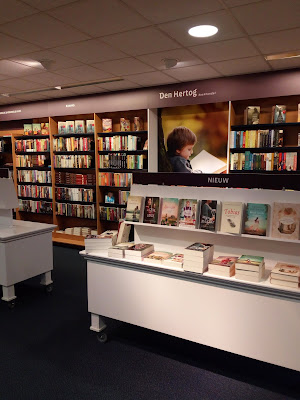I wrote this for More Than Writers, a wonderful blog for Christian writers.
There is something special about reading in a foreign language. Somehow it can make the words feel more powerful, more memorable. In secondary school we read Macbeth during English classes, and for many years a friend and I would start our plan-making with, “Where shall we three meet again? In thunder, lightning or in rain?” The other one would answer with the next lines, and we would laugh like only teenage girls can. In Dutch, it would just sound silly, but the foreign sounds of the words made it ‘cool’.
A few weeks ago we visited a large Christian bookshop in the middle of the Netherlands. Books everywhere, not just Christian ones, but all clean and wholesome. The children’s section is massive, making me feel sad, as well as wonder how fast my kids could learn to read in Dutch… Many of the titles have been translated from English, a job that makes me shudder. I have done one translation project, and it was hard work. For one thing, it was for the ex-Dutch market, so they wanted it in what we call Dunglish. It’s awkward having to write against the grain, forming sentences that are just…not English.
I hardly ever read translated books in Dutch, as most of the time I can guess what it would have been in English, usually more natural sounding. Apart from reading out loud. I would prefer to do that in Dutch. Even words like ‘lichtschakelaarknopje’. (If only my kids could understand Dutch…). My main worry about my books is having some sort of meetup, and people asking me to read an excerpt from my book. You see, I know a lot of words, can spell most of them (the red line underneath the words helps) but there are still a lot of words that I’m not quite sure how to pronounce, especially when under pressure.
Words like ‘peer’. Does it sound like pear or beer? And what about ‘scone’? (Which way do you do?) My older son loves the sound of words, and a funny word can make his day. Whenever they listen to a book, he will pick on all the funny expressions, the imaginative ones, interrupting the story with his infectious laugh. He will usually lose his balance when laughing a lot though, so shrieking laughter and streaming tears are often close together.
Some books can be like that too. It leaves me grateful for those people who slog their way through a book, translating it. It’s a skill, a blessing, and never easy. It’s not just about the correct words, or the right sentence structure (English is so organised! You do people, place, time at the end of a sentence. Dutch? Any time, any place, anywhere…almost), it is also the right weight of the words, for the soul of the message has to come across.
It’s like reading out loud that awful sentence in Genesis when Adam is hiding, “Where art thou?” So much in three words, even if they are simple words that we could all pronounce or translate or read. Can we convey the soul of those words though? Are we the living translation of those words, in our reading and our writing as well? Like I said, translation is never easy!
